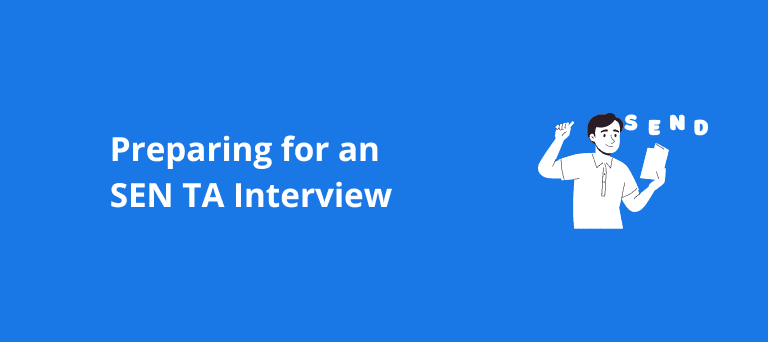Ellie K.
15 Jun 2023
5
min read

An SEN TA (Special Educational Needs and Disabilities Teaching Assistant) plays a vital role in the education of children who need extra support due to disabilities or learning difficulties. This article will help you to prepare for your interview and bag your next SEN TA job with the help of expert advice from two industry professionals - Megan Bartlam (SEND Teaching Assistant) and Lucy Radford (qualified teacher of vision impaired pupils and part of the Coventry SEND Support Service team).
Do Your Homework
We recommend you research the job role and its responsibilities, and target your exploration specifically to the school you're applying to. Lucy advises you to:
‘look at the school website and read the OFSTED report, paying specific attention to SEND. Visit the school, talk with the SENCO (Special Educational Needs Co-ordinator). Ask questions about the role, the ages of the children you would be working with, and their specific conditions which could include: ASD, vision impairment, hearing impairment, physical disabilities etc.’
This groundwork will offer you specific information to prepare with. You will be primed for interview questions, and able to generate your own questions to ask the interviewer. Megan emphasises your questions should relate to ‘making sure the children are happy, healthy, safe, with learning as the main priority.’
This, in short, is safeguarding. It is vital that you have a thorough understanding of the responsibilities that come with safeguarding children. Zen Educate's safeguarding training helps all staff understand their roles and responsibilities to keep children safe. The training is provided for free to everyone who registers with Zen.
Personal Qualities
Working as an SEN TA is not just about knowing your stuff intellectually, but also possessing emotional intelligence. As Megan explains:
‘being an SEND Teaching Assistant is definitely a lot of hard work - physically, mentally, and emotionally, but it’s so rewarding and the relationships you make with the children are amazing! The trust and care you build with them is unbelievable. One of the top qualities you need is a lot of patience and understanding; as much as you know the children, they are different every day. You need to get to know the children as all of them are individuals who need different support. Their needs may be physical, emotional, sensory, or to do with communication. Motivating and encouraging students is key.’
You can learn about strategies to support children with SEND in our article 5 Top Tips for SEN Teaching Assistants. Contemplate the ways in which you as an individual are ideal for the role, perhaps you are kind and understanding, or patient and resilient, make sure you put these characteristics across during your interview.
The Interview: Putting Your Knowledge to the Test
Ensure you have solid answers to the usual interview questions and answers to questions specifically about SEND – and practice them out loud! As Megan explains in this job role ‘clear communication is vital.’
You may be asked a question such as 'what techniques would you use to support children who are non-verbal?' In this case you may opt to use Megan’s methods; to ensure that she and her pupils can communicate effectively she uses ‘visual cards, emotion cards, and a visual timetable so they have a way of telling me their needs non-verbally, and they can understand how the day is going to pan out without getting stressed by not knowing what’s next.’
You are also likely to be asked questions relating to safeguarding. For instance – what would you do if a child discloses sensitive information to you? Make sure you have specific and in-depth answers to questions like these so you can show the interviewer that they can trust you to take the correct course of action.
Lucy suggests you ‘make a mind map of all your experiences so you can feel confident drawing from them in the interview’ when talking about your previous work and answering questions. Lucy goes on to say that you ‘may have to perform a task with children as part of the interview, again, try and find out as much information about the children as possible. Try and make the task practical and engaging – I would suggest not to involve any reading or writing as you are unlikely to know the children’s levels of working.’
Restorative practice in schools and the SEN code of practice 2018 are also essential topics to consider.
To conclude, the best way to prepare for your SEND TA interview is to learn as much as you can about both the job, and the school itself. Understand the role and how your qualities are a good fit, and practice answering questions, making sure that you draw on your experiences and knowledge to give the best answers that you can. Familiarise yourself with the SEND acronym, the SEN code of practice, and the Special Educational Needs and Disability code of practice to strengthen your understanding.



